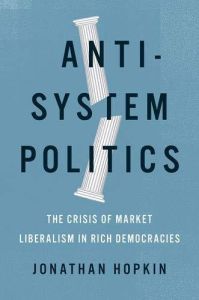Join getAbstract to access the summary!

Join getAbstract to access the summary!
Jonathan Hopkin
Anti-System Politics
The Crisis of Market Liberalism in Rich Democracies
Oxford UP, 2020
What's inside?
Without the global financial crisis, neither Donald Trump nor Brexit would have triumphed.
Recommendation
In this intriguing look at Brexit, Donald Trump and other disruptive political phenomena, Jonathan Hopkin argues that the surprise political results in 2016 weren’t really about immigration, racial tensions or other social issues. Rather, the British political scientist asserts, voters were simply fed up with the neoliberal status quo. The masses watched greedy financiers lead the global economy into crisis, then escape with bailouts that left the rich richer and everyone else struggling to stay above water. In short, when it comes to “anti-system politics,” it’s all about the money.
Summary
About the Author
Jonathan Hopkin is an associate professor of comparative politics at the London School of Economics and Political Science.
















Comment on this summary